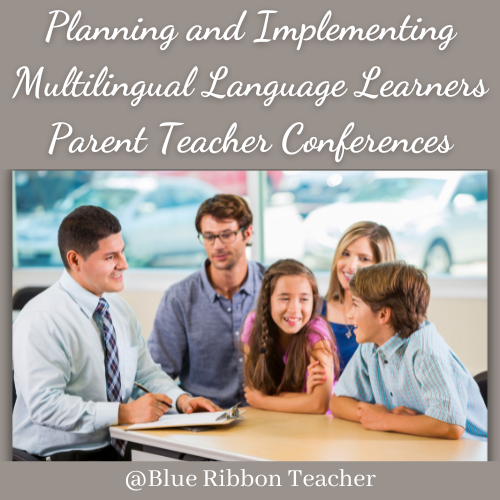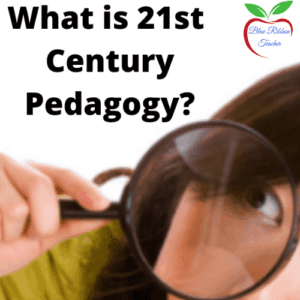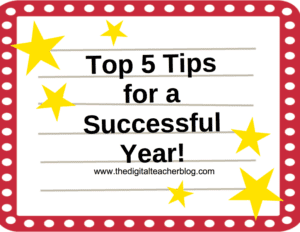How to Have Successful Conferences for Multilingual Language Learners
Leading successful parent teacher conferences for your multilingual language learners can be stressful for some educators. Add another layer related to parent language barriers to the mix, and there may be some anxiety, sweat, and an increase in the heart rate. Yikes!

Are you preparing for successful parent teacher conferences for your multilingual language learners?
Maybe you are feeling uncomfortable meeting with multilingual parents due to language barriers.
Perhaps you’re not quite sure how to communicate the essential elements parents should know to support multilingual language learners.
Maybe this is your first time meeting with multilingual parents or even talking with the parents.
Honestly, I know how you feel, as I’ve had these same thoughts and concerns. Over the years, I’ve gone from dreading conferences to being excited to meet with all parents. Therefore, I pulled together some tips to help you and multilingual parents have a successful conference. I hope you will find this information useful as you prepare for your conferences.
This post may contain affiliate links, and I may earn compensation when you click on the links at no additional cost to you.
Three Phases for Successful Multilingual Language Learners Conferences
In order to plan for successful multilingual language conferences, consider breaking down the preparation into three stages. Within each stage identified below, I share specific information that can be done easily and result in a successful parent teacher conference experience for you and your multilingual language learners and families.
Before the Conference
It is important to know if parents/guardians only speak their native tongue, understand some English, or communicate well in English. If parents/guardians do NOT speak English or understand English, it is important to request an interpreter (see the Federal law links shared below). This request can be scheduled through your school’s Multilingual Language Teacher.

Some districts utilize an “on-demand” interpreter service representing many languages.
This is an important service to support multilingual language learners and their families with a successful parent-teacher conference.
You’ll want to set this conference up in advance to ensure the interpreter is available when the conference is held.
It is important to remember when scheduling conferences with an interpreter, you should add a little more time to the conference, about 10 minutes.
Why is this important?
The interpreter will require time to communicate the information to the parents and vice versa.
Finally, being aware of cultural differences and educational expectations will alleviate some concerns for yourself and the parents. With the help of your Multilingual Language Teacher, it is helpful to learn about the cultural and educational expectations parents have regarding their child prior to engaging in the parent-teacher conference.
Remember, taking the time to plan your conferences will yield successful parent teacher conferences for your multilingual language students.
During the Conference
Staying “on time” during conferences is paramount. Since interpreters need additional time to translate, scheduling extra time will be helpful. Being timely demonstrates respect for the parents you are conferencing with and those waiting in the hall or standing in line. I use a timer to keep my conferences “on time”, and found that parents are always appreciative of this gesture. I also let the parents know that we can schedule another time to finish the conference if there are other concerns that need to be discussed.
When discussing the student’s progress, please speak directly to the parents, not the interpreter. Pause often or chunk information to allow the interpreter time to translate what you have said to the parents.
We know that a picture is worth 1,000 words. Therefore, have simple documents such as student work available to demonstrate specific ideas you want to share.

Provide important documents translated into the native language for parents to take home.
Again, see the Federal law links shared below.
Remember, GoogleTranslate or ChatGPT are great resources for translating documents.
Just remember, oftentimes these translator resources are not 100% accurate.
Remember to offer any community and district resources that can support the student’s learning at home in the native language. Parents want to help their child, but may not be aware of where or how to get that extra support. Teachers are often a bridge between school, home, and community.
We know that reading is an essential skill for all K-12 learners. Encourage parents to have their child(ren) read books at home to build literacy skills. Share local library information and put out discarded books from the library for students to take home. For families who have children under five years old, suggest enrollment in the Imagination Library where FREE books can be sent in the mail to the child’s home address.
Finally, a lot of conversation has happened in a short amount of time. Always leave time for parent questions. Always! Let parents know how to reach you for questions that surface later that day or another time. If you have business cards with contact information, share your card.
After the Conference
During the conference, you wrote several notes about parent concerns and action items that need attention. It is important to follow up with any questions from the parents.

Perhaps you need to reach out to a specialist educator(s) or gather resources to send home. Remember, follow-up can be done by email, phone, app, or in person; therefore, ask the parents the best way to communicate the follow-up information. If you need a translator, please reach out to me or your school’s administrative secretary.
Always remember to document your conversation and follow-up details in your communication journal for future reference.
Perhaps no additional information was needed to relay to the parents; therefore, a follow-up conversation did not need to happen. An effective gesture that can go a long way in developing a relationship is sending a thank you note to parents. This simple thank you gesture is a great opportunity to keep the communication going with parents and cultivate the relationship for future interactions.
Federal Civil Rights for Multilingual Language Learners
Check out the Federal Civil Rights law to provide interpreters and translated documents for our multilingual families. Under federal and state laws, schools must ensure parents and guardians have meaningful access to district and school-related information (p. 2) as well as meaningful communication with parents and guardians (p. 9) regardless of their immigration status.
Cultural Awareness and Language Learners
I am also sharing an article, Why Do You Force Your Ways?, that focuses on cultural awareness. This is a great resource to review and consider while preparing for your conferences.

Several years ago, I came across this article and now share it in my undergrad education classes. I found the message to be powerful causing me to reflect upon my own cultural understanding, views, and awareness. I share this article with you, so you can see another educational perspective by parents of another culture.
Although the article timeframe is “Parent’s Night” aka Open House, I believe this will be relevant for our upcoming conferences.
After reading this article, you may have another perspective about your students and how their culture is considered in education. I would be interested in hearing your thoughts.
Related Resources for Multilingual Language Learners
Check out these related resources to support your successful parent teacher conferences for all of your multilingual language learners.
How to Prepare for Successful and Effective Parent-Teacher Conferences.
Engaging Family Activities to Accellerate Learning
5 Simple Strategies to Welcome Newcomers
Final Thoughts About Successful Parent Conferences
As I know you have figured out, the key to successful parent teacher conferences for multilingual language learners and their family is preparation. How you prepare and the extra steps you take to ensure you meet the language needs for your families will set the tone for future meetings. Use these tips to assist your conference planning and your multilingual language learners and families will be happy to contribute to education.



